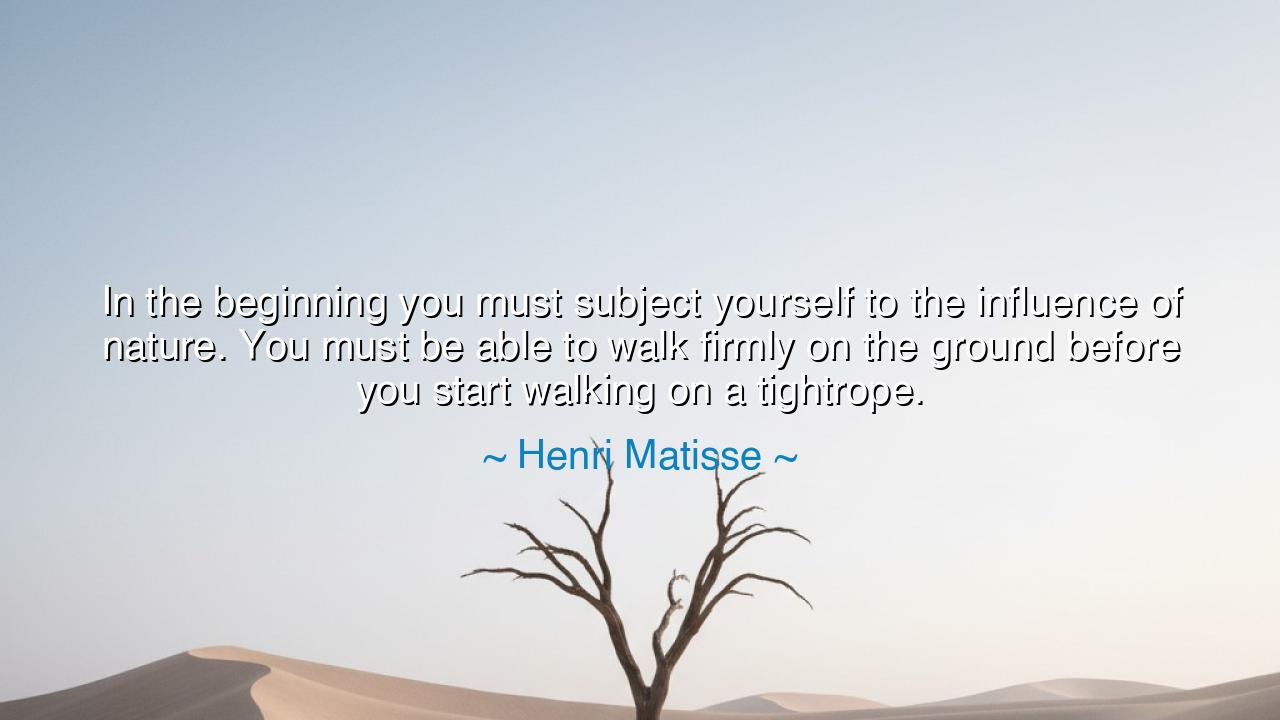
In the beginning you must subject yourself to the influence of
In the beginning you must subject yourself to the influence of nature. You must be able to walk firmly on the ground before you start walking on a tightrope.






Hear, O children of learning, the words of Henri Matisse, master of color and form, who declared: “In the beginning you must subject yourself to the influence of nature. You must be able to walk firmly on the ground before you start walking on a tightrope.” These words are not idle reflections, but a guiding torch for all who would embark upon the path of mastery. They remind us that before the soul may soar, it must first root itself in the earth. Before one dares the heights, one must learn the ground beneath their feet.
In the saying, nature is not merely the trees, rivers, and skies, but the primal source of truth itself. To subject oneself to nature is to be humble before reality, to learn the laws of form, of balance, of patience. Just as the seedling must first stretch its roots into the dark soil before rising toward the sun, so must the artist, the thinker, the dreamer learn from what is solid before attempting what is rarefied. To walk on the ground is to embrace discipline; to leap to the tightrope without this grounding is folly, and leads to ruin.
Consider the tale of Leonardo da Vinci, the great mind of the Renaissance. Before he painted the swirling mysteries of the Last Supper, before he sketched his visions of flying machines, he spent long years studying anatomy, the flight of birds, the growth of plants, the movement of water. He bent his genius first to nature, observing every detail with reverence. Only then did his imagination dare to ascend to the tightrope of invention, where he balanced between science and art, reality and vision. His greatness lay not in leaping blindly into the air, but in building his wings upon the firm foundation of earthly truth.
There is heroism in this humility. The proud wish to skip the beginning, to chase greatness before laying their foundations. But Matisse, like the ancients, teaches us that the path of mastery begins in submission. The warrior must first learn to stand before he can wield a sword. The poet must first learn words before he can sing the eternal songs. The architect must first measure stone before he may raise a temple to the sky. To despise the ground is to fall from the rope.
Yet there is also encouragement in this teaching. For the ground is always near, always ready to steady those who tremble. To return to nature, to basics, to discipline, is never shameful. Even the master returns to the ground when the rope sways too wildly. The earth does not reject us; it invites us to rest upon it, to regain strength, to rise again when the time is right. Thus the student need not fear failure: every fall is but a return to the ground, a place to begin anew.
The lesson for us is clear. If you would master any art, begin by observing, listening, humbling yourself before the world as it is. Whether you seek to paint, to write, to lead, or to live wisely—study nature, study reality, study the firm ground. Build patience before ambition, discipline before daring, knowledge before speculation. Only then will your step upon the tightrope be sure, your balance steady, your heart unafraid.
Take this into your daily life. When you wish to create, begin by imitating what is real. When you wish to innovate, begin by mastering what is known. When you wish to lead, begin by listening. Do not despise beginnings, for they are sacred ground. Every great leap arises first from steady steps. Every tightrope walker must first have walked the earth.
So I say to you: subject yourself to nature, walk first on the ground, and then ascend with courage to the tightrope. For in this way, you will not only reach the heights, but dwell there in balance, enduring as one who has honored the wisdom of both earth and sky.






AAdministratorAdministrator
Welcome, honored guests. Please leave a comment, we will respond soon